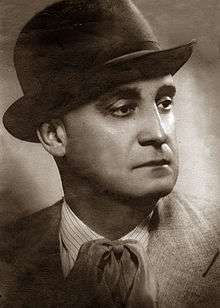Traian Popovici
| Traian Popovici | |
|---|---|
 Traian Popovici in 1927 | |
| Personal details | |
| Born |
17 October 1892 Ruşii Mănăstioarei, Duchy of Bukovina, Austro-Hungarian Empire |
| Died |
4 June 1946 (aged 53) Colacu, Suceava county, Romania |
Traian Popovici (October 17, 1892 – June 4, 1946) was a Romanian lawyer and mayor of Cernăuţi during World War II, known for saving 20,000 Jews of Bukovina from deportation.
Life
Traian Popovici was born in Ruşii Mănăstioarei village of the Duchy of Bukovina in the Austro-Hungarian Empire. He was the son of Andrei Popovich of Suceava and grandson of the priest Ioan Popovich, a famous priest, who, in 1777, refused to take the oath to the Austrian Empire.[1][2] His uncle was Dori Popovici (1873-1950), who became a minister for Bucovina under the government led by General Alexander Averescu.
He studied at the Suceava high school (1903-1911), then enrolled at the Faculty of Law of the University of Chernivtsi, which he graduated at the end of World War I. He was a former president of Societatea Academică Junimea. In 1908, while a high school student, he crossed from Austria-Hungary into Romania illegally, in order to see Nicolae Iorga who was visiting the town of Burdujeni.[3] When World War I started, he went to Romania and enlisted in the Romanian Army, fighting until the end of the war. After World War I, he settled briefly in Chișinău, where he was secretary at "Our House" organization that dealt with land reform.
In the interwar period, he worked as a lawyer in the city of Chernivtsi. After the Soviet occupation of Northern Bukovina in June 1940, he took refuge in the city of Bucharest, where he continued to work as a lawyer.
Mayor of Cernăuţi
Military dictator Ion Antonescu requested him to become mayor of Cernăuţi, but Popovici initially refused, unwilling to serve a fascist government. He changed his mind, however, based on advice from his friends. A few days after acceptance, he was ordered to create a ghetto for the Jews of Cernăuţi, but Popovici refused to accept that part of the city's population could be confined behind barbed wire fences. After long debates, the governor of the region accepted his point of view. Due to Popovici's defense of Jews, his political adversaries nicknamed him "jidovitul" ("the turned-Jewish").
In 1941, the new governor announced his decision that all the Jews of Cernăuţi must be deported to Transnistria. After talks with the governor, the latter agreed that Popovici would be allowed to nominate 200 Jews which were to be exempted. Unsatisfied with the modest concession, Traian Popovici tried reaching Antonescu himself, this time arguing that Jews were of capital importance to Cernăuţi's economy and requested a postponement until replacements could be found. As a result, he was allowed to expand the list, which covered 20,000 Jews in its final version.
He is honored by Israel's Yad Vashem memorial as one of the Righteous Among the Nations, an honour given to non-Jews who behaved with heroism in trying to save Jews from the genocide of the Holocaust.[4]
See also
References
- ↑ Emil Satco - "Enciclopedia Bucovinei", vol. II (Ed. Princeps Edit, Iași, 2004), p. 251
- ↑ https://www.jewishvirtuallibrary.org/jsource/biography/Popovici.html
- ↑ Un Wallenberg al României
- ↑ http://www.yadvashem.org/yv/en/righteous/stories/popovici.asp
External links
| Wikimedia Commons has media related to Traian Popovici. |
- Popovici's testimony on the deportation: